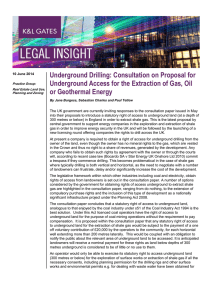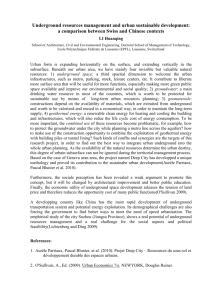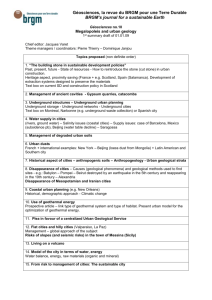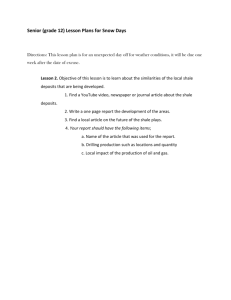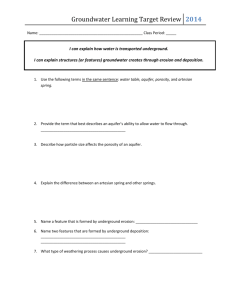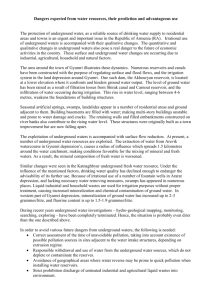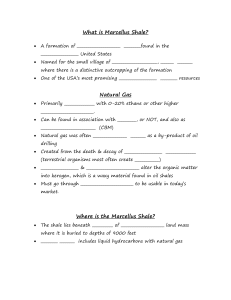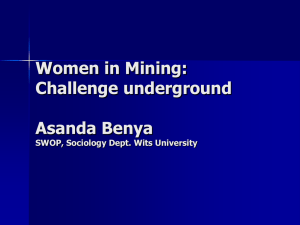View as DOCX (1) 144 KB
advertisement
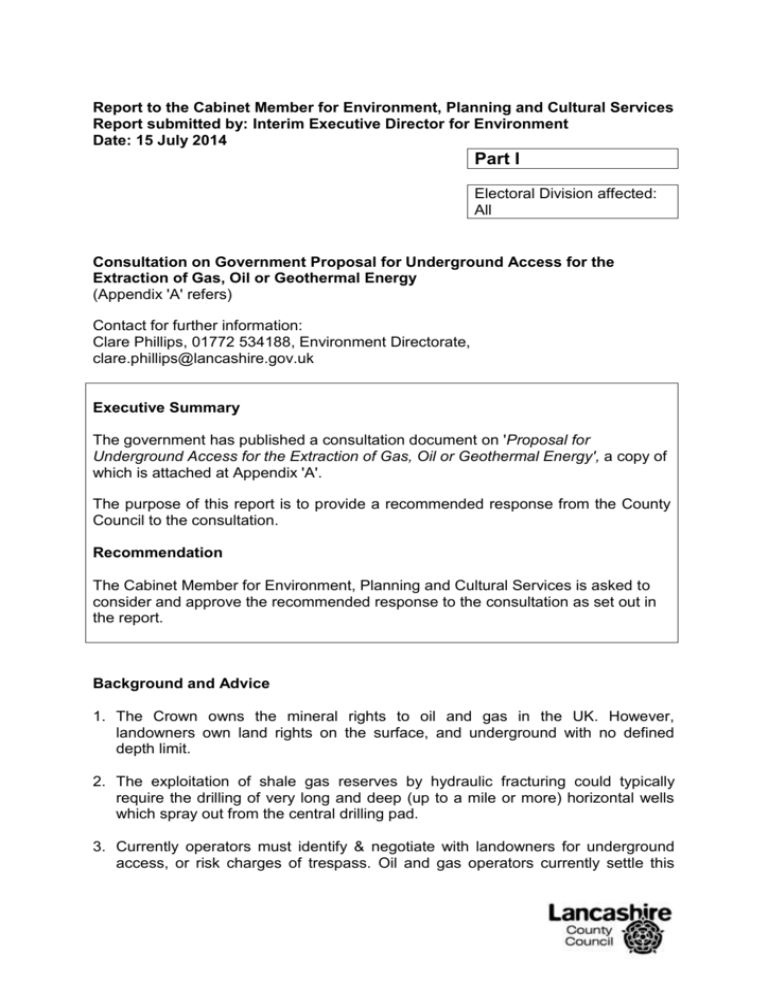
Report to the Cabinet Member for Environment, Planning and Cultural Services Report submitted by: Interim Executive Director for Environment Date: 15 July 2014 Part I Electoral Division affected: All Consultation on Government Proposal for Underground Access for the Extraction of Gas, Oil or Geothermal Energy (Appendix 'A' refers) Contact for further information: Clare Phillips, 01772 534188, Environment Directorate, clare.phillips@lancashire.gov.uk Executive Summary The government has published a consultation document on 'Proposal for Underground Access for the Extraction of Gas, Oil or Geothermal Energy', a copy of which is attached at Appendix 'A'. The purpose of this report is to provide a recommended response from the County Council to the consultation. Recommendation The Cabinet Member for Environment, Planning and Cultural Services is asked to consider and approve the recommended response to the consultation as set out in the report. Background and Advice 1. The Crown owns the mineral rights to oil and gas in the UK. However, landowners own land rights on the surface, and underground with no defined depth limit. 2. The exploitation of shale gas reserves by hydraulic fracturing could typically require the drilling of very long and deep (up to a mile or more) horizontal wells which spray out from the central drilling pad. 3. Currently operators must identify & negotiate with landowners for underground access, or risk charges of trespass. Oil and gas operators currently settle this -2through negotiation with the landowner(s), but there is an existing legal route by which they can apply for access in the courts where this cannot be negotiated. 4. At present, landowners tend to receive some kind of payment in return for the right of access below ground. This is negotiated privately between the company who wants to access the land, and the individual. There is no standard payment level and landowners could request any amount of money (or none at all). Payments for below ground access are usually of a nominal value. 5. These access rights have been the focus of some attention recently. In the Supreme Court case of Bocardo SA –v- Star Energy UK Onshore Limited, the energy company who undertook drilling beneath land owned by one of Al Fayed’s group companies, without their consent, was ordered to pay a very nominal £50 damages for trespass. Mr Al Fayed was seeking many millions in damages, essentially arguing that he was entitled to a share of the profits from the exploitation of oil reserves under his land. The court did not rule in his favour on that. More information can be found here: http://www.eversheds.com/global/en/what/articles/index.page?ArticleID=en/Energ y/UK_on-shore_shale_gas_and_land_rights_140127 6. In October 2013, Greenpeace launched a campaign called 'Wrong Move' to exploit what they reported at the time was a ‘legal loophole’. Greenpeace has encouraged people to actively proclaim their opposition to drilling and create a patchwork quilt of non-consenting landowners to frustrate plans to carry out drilling. http://www.wrongmove.org/ The Consultation 7. The consultation can be read at the following link: https://www.gov.uk/government/consultations/underground-drilling-access 8. This is a Government consultation on proposals to reform the procedure for gaining underground access to oil or gas deposits and geothermal energy. The consultation examines the existing procedures by which companies who wish to extract oil, gas or geothermal energy obtain access to underground land, and the problems raised by these procedures. 9. The government believes that in so far as underground development goes, the existing system (see 3 &4) does not strike the right balance between the legitimate interests and concerns of landowners, and the benefits to the community and nation at large of permitting development, where that development is otherwise acceptable in planning and environmental terms. The consultation also sets out the options and conclusions that have been considered during this process. 10. The option to do nothing was rejected. The government concluded that the difficulties associated with the existing framework mean that the shale gas industries will not be able to fully explore shale gas potential in the UK. -311. It was concluded that the impact on the landowner from underground drilling is negligible, and broader issues of concern about the environmental and other impacts of the proposed activities are addressed through planning and other regulatory frameworks. So it is considered that there is a case for changing the statutory framework to provide for underground access without the complexity and expense of the existing procedure. 12. The government have drawn similarities between access to airspace, coal, utilities and telecommunications rights of access; and they have concluded that a statutory right of access would be an appropriate solution to allow companies to access underground land for the purpose of extracting petroleum or geothermal energy. 13. Consideration was given to requiring the operator to negotiate access with a large group all in one go. This would reduce some of the administrative costs associated with contacting and negotiating with each landowner. However, the government considers that this would not bind any member of the group who disagreed, and therefore does not remove the fundamental problem: that the ability of individual landowners to obstruct the project is disproportionate to any impact it might have on them. 14. Another option considered was enabling companies to apply for compulsory rights orders under an Acquisition of Land Act 1981 procedure. This route requires express applications to be made for land or rights, and a lengthy compulsory purchase-style inquiry procedure to be gone through under the Act. The government do not consider it necessary or appropriate for a lengthy application procedure to apply where all that is needed is use of deep underground land. It is therefore considered by the government to be no advantage (to either land owners or exploration companies) in legislation being enacted which replicated these sorts of compulsory purchase provisions. It is considered by government that exploration companies do not require land or rights to be transferred to their ownership. A statutory right of access is sufficient, and would have the merit of not dispossessing land owners of any substantial property rights. 15. Similarly, the Government have considered bringing the technologies within the Planning Act 2008 regime. The Planning Act 2008 is a mandatory consent regime which applies to projects deemed "nationally significant infrastructure" projects. However, the process of obtaining a development consent order is extremely lengthy (a minimum of 15 months from application to consent, plus approximately a year's pre-application consultation). To be obliged to undertake this expensive and time-consuming process multiple times to drill a series of exploratory wells is not a workable option for the industries involved, at such an early stage of development. 16. Community ownership schemes were also considered as an option. This would allow local people to take a financial stake in a project (and therefore a share in the profits), making them more likely to approve of that project. However, the government do not believe that this would sufficiently address the fundamental problem that any individual could be unable or unwilling to participate. -4The Government Proposal 17. The government proposal consists of three different elements; each designed to address specific issues. A right of underground access This first element draws on the existing statutory right of access offered to coal operators. The proposal would grant underground access rights to companies extracting petroleum (as defined under the Petroleum Act 1998 – including gas or oil) or geothermal energy in land at least 300 metres below the surface. This underground access would only apply to companies seeking to extract energy (in the form of petroleum or naturally-occurring heat) from land below 300m. It is important to note that fracturing would not take place at 300m; it would be much deeper – usually over a mile down. 300 metres has been chosen as the landowner is very unlikely to have any use of the land below this level and below this depth the vertical drill may need to start changing direction. The right of access would exist independently of other necessary permissions; effectively removing the issue of trespass at these depths for these purposes A payment in return for the right of access At present, landowners tend to receive some kind of payment in return for the right of access, above and below ground. This is negotiated privately between the company who wants to access the land, and the individual. There is no standard payment level, and landowners could request any amount of money (or none at all). Payments for below ground access are usually of a nominal value. The government believe that people living above underground drilling should continue to receive some kind of payment from the operator in return for the right of access. This view is in line with other schemes that grant access rights such as underground cables and tunnels. The shale and geothermal industries have put forward a voluntary offer for a payment system. This will involve a £20,000 oneoff payment for each unique lateral (horizontal) well that extends by more than 200 metres laterally. Where lateral drilling vertically coincide payment will be made only once. It is the government's preference for this payment to be made to a relevant community body. The consultation does not define 'community' or specify affected landowners. It might be considered that this is 'generous' payment given precedent that has been set in the Supreme Court case of Bocardo SA –v- Star Energy UK Onshore Limited where £50 was offered as compensation for trespass. (See 5) A notification system for the community This option would include a proposal for a public notification system, under which the company would outline matters such as the relevant area of underground land, coupled with details on the payment that will be made in return for the access. Recommended consultation response The following response to the consultation is recommended: -5- "The County Council believes that given the existing framework this proposal represents the best way forward to ensure a balance between the need of industry and an offer of payment to communities in return for nominal rights to underground access. However, it is the County Council's view that it is of paramount importance that concerns about environmental impact and public safety still be properly addressed if shale gas extraction is to be pursued. Members at the county council unanimously supported a Notice of Motion last year calling on the Government to put in place industry-specific regulation, and to ensure local planning control is maintained. It is also the County Council's view that further consideration needs to be given to models for community funds to ensure that they support communities’ priorities and deliver lasting benefits in a transparent and accountable way." Consultations N/A. Implications: This item has the following implications, as set out in the report. Risk management N/A. List of Background Papers Paper Date Nil. Reason for inclusion in Part II, if appropriate N/A. Contact/Directorate/Tel
